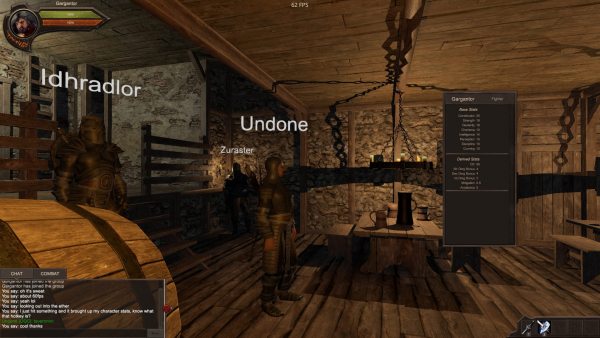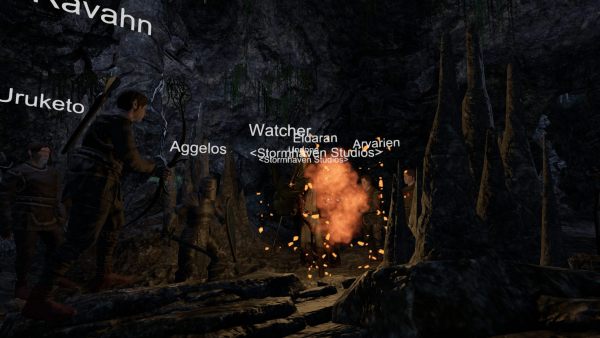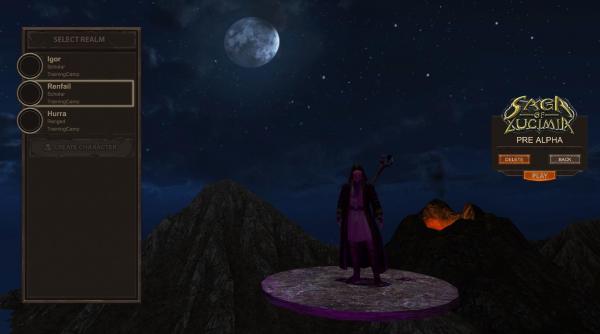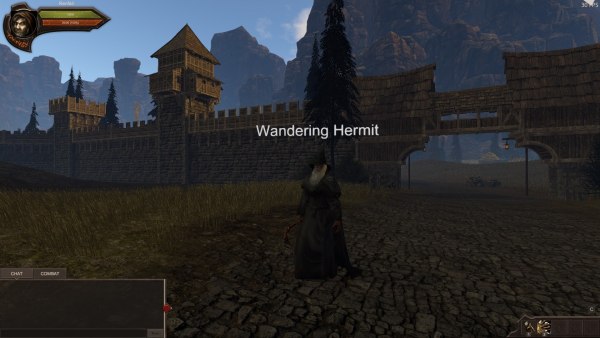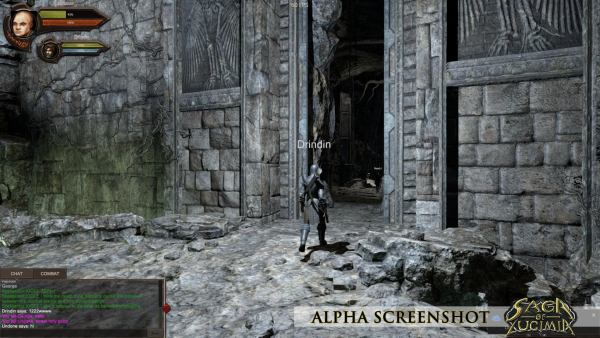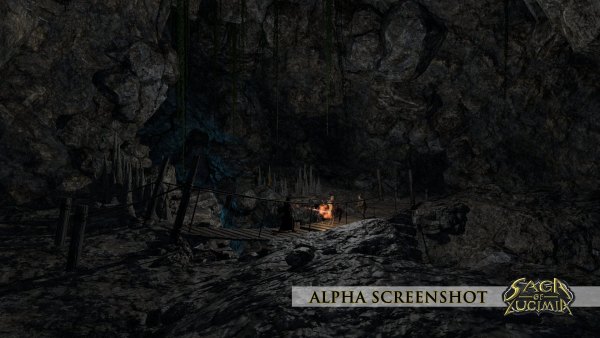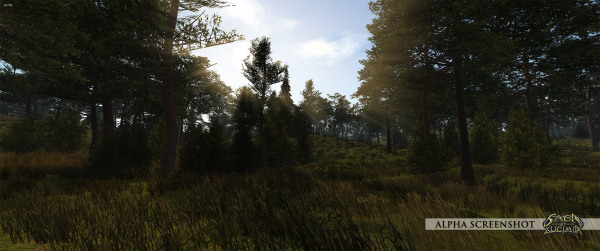Interview With Stormhaven Studios, Developers Of The Saga Of Lucimia

I recently had the chance to sit down with Executive Producer Tim Anderson, Producer Giovanni Martello, and Programmers Robert Thompson and Richard Kuhn of Stormhaven Studios, the developers of Saga of Lucimia. We talked about the caravan system, emergent gameplay, tomorrow's Early Access build, and more.
Me: You talked a bit about emergent gameplay and how each server will have its own tale to tell in one of your blog posts, but how will they go about telling it? How will the world change to show that they have told a story there?
Anderson: We’re not doing any sort of phasing. I don’t think we have any plans for any sort of dynamic world where things change automatically. We’re going to be implementing changes as we go along, based on a variety of things. We have, first and foremost, the Volume 1, Volume 2, Volume 3, and Volume 4 planned out, but we’re also going to be working on doing live events every so often and between those expansions. Those should be about two years apart.
We’re going to be doing live events, which will change the landscape and change zones around. We’re also doing some things that are a little bit unique. We’re going to be moving NPCs around, moving trainers around, so that players will at least find it more difficult to create a Wiki with all of the information of the game on it. We’re moving the NPCs around. We’re not telling people. We’re not putting any of this information in the patch notes. Player A might say that Ranger Bob is here and Player B goes to that location and goes “what the hell? Where’s Ranger Bob?” We’ve actually moved Ranger Bob three zones over and haven’t told anybody. There will be in-game story reasons for those moves and, if you follow the in-game clues, you will be able to figure out where he’s going.
Martello: I think the other answer to this question is “keyed content.” We plan out a lot of that. Much of that is probably going to be quests that will have to be done. The community will have to get involved. I used an example, I think, internally of “bandits are preventing the community from moving from one zone to the next through a certain entrance so, until that threat is taken care of, nobody would be able to move into that zone beyond.”
So there are going to be things like that where you go to one server “oh, they don’t have that zone opened up yet.” There are things that we can do that way. I’m sure, at points, we’ll announce certain things if they’re a big deal. I think back to like the Sleeper in EverQuest. That was a big deal when somebody did that first. We’d like to commend the server communities when they get to a certain point like that.
Anderson: In EverQuest 1—way back in the day—they used to have GMs, which is essentially what we’re going to be doing. They would have these live events where there would be a curse and everybody would get sick in these certain zones. Until that curse is cured, everybody stays sick. There are things that are planned out and programmed out. They last until the server community finishes it. We’ll be doing those kinds of events in between the expansions.
Do you envision that there will ever be an “endgame” or what that endgame might be like?
Anderson: Yes and no. The way this works is that we are planning traditional storyline content that players can optionally follow. We’re not doing experience points and we’re not doing levels. The storyline that’s there, that follows the story so far in the chapter content, is an optional questline. If players want to pursue that, it will lead them through single-player content, crafting content, group content, and raid content—eventually. That will hopefully span the course of around 18-24 months of gameplay for the average person. Hardcore players might burn through that in eight or ten months. That would be what we consider to be the “endgame” because, once you reach the end of the Volume 1 storyline, there’s not going to be the continuation of that storyline until Volume 2 comes out, but there will also be an infinite number of things to do because this is a sandbox environment. There are always going to be City Quests, Zone Quests, Dungeon Quests, and all the adventures that you could have with your own group.
So yes and no is the answer to that question. What we’re working really hard on is we’re not doing hitpoint bloat, skill bloat, or gear bloat. This is going to be another kind of “falling back to the old school method.” In EverQuest, it might take you six months from the time you started the game until you got your first magical piece of gear. Six months of gameplay of just running around in rusty old chain and leather armor and then you get your first magical piece. That piece of gear is going to last you anywhere from six months to a year. You’re never going to get rid of that. It’s going to last you a really long time. We’re working with that same principle that the magical gear is very, very rare, hard to get, and once you get it, you’re going to hold onto it. There’s not going to be this constant gear grind and gear update every three months where there’s this rush to pursue and become the “top dogs” of the endgame every few months. When you get a piece of gear, it’s going to need to last you for a really long time.
But there will be a lot of content in between there. Crafting, factions, languages, to just name a few things.
So you’re not planning on having the traditional raid bosses after raid bosses and dungeons after dungeons endgame?
Anderson: Like I said, there will be that scenario in the Volume 1 storyline. If you follow that, it will lead you through a progression of quests over the course of a couple of years where you will eventually get to the point where you are entering raid dungeons to kind of finish up the storyline.
But no, we’re not doing any sort of dailies or anything like that. So we won’t be like World of Warcraft or Star Wars: The Old Republic or any of those games where your whole objective once you get to the end is to just sit there and grind out dailies. That shit will not exist in our game at all.
I was also reading that you guys don’t like that modern games allow you to “max out” in a month or less. I was wondering; what do you anticipate it will take to “max out” in Saga of Lucimia?
Martello: We know what we plan, but we have to test to see how players do. They always do differently than you plan.
Anderson: Here’s the thing. We’ve got the Volume 1 storyline, which is the primary storyline, and we’re hoping that we can provide 18-24 months of gameplay for the average person who plays, say, 15-20 hours a week. Now, if someone plays 40 hours a week, they’re going to burn through that content three times to four times faster than the average player does.
Now, what we have to make sure that we do is to also include enough content with the City Quests, the Zone Quests, and the Dungeons themselves, which are outside of the raid zones and outside of that primary storyline content, we need to make sure that we provide an ample amount of that content, as well. In a perfect world, there will be regular, fantasy world environments and adventures that you can partake in that don’t necessarily have anything to do with the main questline. All optional. All over the world. That should provide a couple of years of content for the average player. Plus, there will be a couple of years of content within the primary storyline. That’s not even talking about crafting and languages and all of the subsequent things that you can do.
We’re also working on about 500 skills in the game. While you do have your primary, secondary, and tertiary skills, you can have all of those skills. You can potentially learn every single ability in the game. You won’t necessarily be able to take all of those skills to the cap, because you’ll be limited by your stats and so forth—and also by how many skill points you have—but there’s the potential to have all of those skills at your disposal.
If you really want to take the time and fully flesh out your character, there will be the option to get out there and absolutely maximize on that.
So you don’t anticipate that anyone will max out any time soon after launch?
Anderson: We keep coming back to EverQuest 1 because that was a big influence for us. We all kind of started with that game. I can remember it took me around three years before I ever got to my cap with my ranger. It was, I think, around two years before I ever got my epic weapon. Quests and leveling took time. You weren’t doing quest grinds. You were exploring with your friends. You were learning languages. You were going off and pursuing these super rare mobs that might only show up once every three weeks. It was a constant adventure to seek things out. This was also pre-Wiki and pre-internet, so to speak, in the sense that we had handheld journals and we didn’t have mini-maps telling us where to go and where to find quest mobs and where to find NPCs.
We’re not using mini-maps in our game. There is no glowing icon over NPCs’ heads telling you who are quest givers. There’s no map showing you where to go. There are no glowing trails showing you where to run to. You’re going to have to figure all of that out. When you factor that in, there’s a whole other side of the game that players have kind of lost in the modern MMORPG and that’s the exploration. You don’t know where you’re going. You don’t know where things are at. You have to figure it out.
Thompson: I think one of the interesting things that our game offers, as well, is that the skills are not going to be like you walk up to a trainer and just say “hey, I’d like that skill.” You have to go find it. It’s more reason to go out into the world and do that exploring that you may not have done otherwise because you don’t know where these things necessarily are, so you’re going out there to look for them.
Anderson: Robert brings up a good point because we’ve said in the past that we’re anticipating roughly 85% of the skills in the game will not be found inside of a city or an outpost. They will instead be found out in the wilds and in the depths of dungeons and you’ll have no clue where they’re at. It’s going to be the community going out there and exploring and finding them.
When you say skills are going to be found through relics, I think you called them, do you mean out of the 500 skills or do you mean combat skills?
Anderson: No, relics are different. Skills and abilities are things like one-handed bashing, tumble, duck, dodge, block. All of the “abilities” you would have at your disposal—passive and active. Relics are just magical pieces of armor, magical pieces of gear, magical items that have bits and pieces of the ancient magic still attached to them. They will all be limited in how many charges they have and then, as we get to the point where we bring magic back into the realm through the course of the storyline, those items will transform and evolve. Players will also find themselves being able to actually cast elemental magic as individuals rather than relying upon the items themselves.
So relics will be items that have skills attached to them that you can’t find elsewhere until magic comes back.
Anderson: Yes. So, for example, in our game, we don’t have clerics. There are no healers in the game to start. Everyone starts off as a basic person. If you want to heal during the initial stages of the game, there’s no in-combat healing. It’s going to be through potions and bandages outside of combat. There will be some limited stuff you can do in a combat scenario, like drink a potion and that will recover some hit points, but there are no heal spells. The only way someone can get a heal spell is if they find, for example, a relic staff in the depths of a dungeon or at the end of a questline and that staff allows them to do some sort of heal over time or a direct heal. It’ll have a timer on it. It might have 50 charges or it might have 500 charges depending on the power of the item.
That heal ability would be otherwise impossible for a player to obtain until we bring magic back into the realm and then we’ll start getting into actually having spells.
How would you go about learning a skill in the wild then?
Anderson: In the beginning, you’re going to have your stats. The stats are tied to skills. You can level up those skills. Subsequent skills will be related to how many points you have in another skill.
Let’s say you have one-handed slashing at 15. You go to the trainer in town and he’s like, “well, I’ve already showed you how to do Sword Slash and Stab. I don’t have anything else to teach you.” You just keep practicing that sword ability in combat. You get it up to 35 points. You’re wandering around in the woods and you happen to stumble across this old guy. You hail him and he’s like “hail traveler. Well met.” You go through the dialogue and you talk to him. You find out that he’s actually someone that has a sword ability and it requires 35 skill points. You have 35 skill points. You can actually train from him and learn that ability. But if he requires 50 skill points and you only have 35, he may not even talk to you. He may say something like “come back later when you’ve earned more strength,” you know, when you’ve gotten better with the blade, but he might not say anything.
Martello: You start out with a direction you want to go. You choose masteries during character creation. The masteries are kind of like containers for skills. It has progression through the mastery as you get better in said mastery. Like Tim said, you’re going to progress and your masteries will go up, your skills will go up, and kind of give you the ability to unlock skills for higher levels within that mastery.
In the beginning, there will be some that will be close by or within town. Anywhere beyond, I think what we have planned is up to 20 or 25, you’ll be able to find without too much work—maybe within town or in some of the zones around the town. But then, from that point on, you’re really going to need to go out with groups and start getting into things and trying to find hidden secrets and treasure chests at the bottom of dungeons that may have scrolls in them that can teach you something or that you can trade with somebody that might have a mastery that you don’t. So there’s going to be a lot of community involvement. You might be able to buy a skill book or scroll from somebody. Maybe you’ll find a trainer out in the wild like we’ve been talking about. There’s going to be different ways to do that, so the ability for players to rush through all that content is not going to be simple, as it’s not just a straight line that you add time and you automatically get to succeed.
Will you be able to level combat abilities?
Anderson: Yes, they do have level 1-100.
So it’s not like you hit 35 points, you find the guy that you get the skill from, and you’re done. There are actually levels.
Anderson: There are actually levels for skills, correct. So Dodge is like 1-100 and then, when you get a subsequent ability tied to dodge, they all have their own level.
How high you can take that skill depends on the stat that governs it. If you’re a dexterity-based character, you’ll be able to take all of your dexterity-based abilities to the max, but if you’re weak in strength, then you’re obviously only going to be able to take strength-based abilities so far because it’s your limited stat.
Can you explain what would make caravans necessary for a long trip?
Anderson: We don’t have fast travel. If you’re thinking about a typical modern MMORPG, when you finish up for the night, what do you do? You recall back to town, you sell, you bank, you repair. You cannot do this in this game. There is no fast travel. There’s no teleportation or anything like that. We may end up putting in some points between cities for once you’ve gotten to a new city and you’ve unlocked the NPC horses that you can take back or something of that nature, but there will not be any actual recall buttons. The whole point of this is that, once you leave the city walls behind, it’s up to you and your group mates—and with a maximum of eight people in your party, you will have a large group of skills spread out between you. You’ll have people who know how to do woodcrafting, people who know how to do leathercrafting, people who know how to forage for food, who know how to track animals, who know how to tame animals, who know how to repair the wagons and so on and so forth.
The waypoint system that most people are accustomed to doesn’t exist in this game, but the caravan has its own waypoint built into it. This is our only version of a “recall” and it’s not so much a recall. Let’s say you’ve adventured three hours tonight and your group has reached a point where four of the eight need to log because they’ve got work or kids or whatever the case may be and you can’t continue onwards because you’re in the depths of a dungeon and that’s it. There’s no recall button to get out, so what do you do? You make camp, you set up your camp, and, if you’re all in the caravan—which there are eight people in that caravan—once you make camp, you’re going to get a special waypoint that allows you to, the next time you log in, go to that waypoint.
Now, let’s say that seven of you can go ahead and continue the next night but one guy can’t because he’s got to go to work that night or whatever the case may be. The group will move on without him and, as long as they don’t go too far, we haven’t worked that out yet—it will probably be a couple of zones or so—but they can move the camp waypoint and, as long as you’re in that caravan and they go ahead and move on without you, when you log in the next day, as long as they haven’t moved out of range, you’ll be able to “catch up” with them by going to the last waypoint and logging in with them.
The purpose of the caravan is so that we’ve got the typical stuff that most people would associate with being able to log in for 30 minutes to 45 minutes here and there and just do quick content. You’re only ever going to be able to do that within close proximity of a city or an outpost. We’re talking lions, tigers, and bears. You can go out with three or four people, maybe two people who are well-geared and it’s even Con or slightly lower Con content. The further away from cities you get, the harder it gets. You will eventually get to a point where you need that full group of eight.
The whole point of this is that, if you look at the Fellowship of the Ring or the Heroes of the Lance from Dragonlance, when you leave on an expedition, you’re going to Mordor. You’re not going down to the river to pick daffodils for your mom. You’re on an expedition that’s going to last potentially weeks. It could last months. The caravan is there so that you could have your own little group of people who are totally independent and rely on each other and could have this group and this adventure that could go on for potentially weeks. Since you can’t recall back to cities, you’re going to be going back to your waypoint with your groups over time. That’s the core of what the caravan system is all about.
So it’s not going to be as simple as just running back to town. Even without the waypoints, you can’t just run?
Anderson: No. Well, you could, but zones are big and there’s no solo content in the game, so if mobs come after you and you can’t get away from then, you will die. We do have corpse runs in our game so, if you die, your loot stays on your body. It’s definitely an old-school, hardcore environment. You don’t really want to go anywhere by yourself. It’s dangerous and that’s before we even get into the concept of the hunter-seeker mobs, which will actively hunt down and track players within zones and seek them out. If you can’t defend against these mobs, you better be able to run to the nearest guard post, because otherwise, you’re toast.
I was reading that caravans are going to have to be guarded. You’re talking about making camp and all, but what happens if everyone is logged out? Will you still have to guard it?
Anderson: In this case, we’re talked about adding some NPCs that you can hire. It might be something as simple as we put a dice roll that’s based upon your characters’ abilities and we see whether you make it.
In Dungeons and Dragons, everything is based off of rolls. There’s never guaranteed success. Just because you’re high-leveled doesn’t mean you get to win.
We haven’t finalized how we’re doing that, but the initial thought on how to guard your caravan is we’re going to use NPCs. We’ve also talked a lot about being able to set traps around the perimeter, which will stop NPCs from attacking while you’re offline. There will be multiple ways. We’re looking at different ways that you can guard the camp, but again, it’s never a 100% sure thing. If the camp is destroyed while you’re offline, there’s a variety of things that could happen. You could log back in and find that your wagons are toast and, because you can’t carry all that armor and supplies on your backs because of weight limits, you’re either going to have to build a new wagon on the fly or leave all your stuff behind and hike it back to town or put what you can on the pack mules and hope for the best.
And just leaving the area for a safer area wouldn’t be an option with caravans?
Anderson: If you can get to it. If you’ve ever played a traditional game, you can run across a zone in 90 seconds—modern day games. What was the size of the zone that you were most recently working on? 6 km or 8 km?
Thompson: It was only 4 km, but still, with our walk speed, it’s still long enough.
Anderson: The average person can run 3 kilometers in about 15 minutes, so we said that, in a 3 kilometer zone, it’ll take about 15 minutes if you run in a straight shot across the zone. A, you’ll never be running in a straight shot across the zone because B, you can’t because of stamina restrictions and weight restrictions and because of the way the zones are set up you really need to stick to the path if you’re anything less than four people. If you’ve got a group of five or six you can head off into the depths of the zone and explore some more.
We’re looking at a zone requiring more or less an hour-ish on the smaller zones to get across and then we’ve got zones that are going to take several hours to get across. Then we’ve got—planned—at least 30 zones for launch. We’re looking at zones being big enough that it’s not going to be as easy as running 15 minutes and getting somewhere safe. You might need to plan ahead a little bit and go “okay, we know there’s an outpost over here. How much time do we have tonight? Do we risk going out and not finding a safe spot to camp or do we only go out so far as we can and still have time to return to the outpost?” You’ll have to make strategic calls about that kind of stuff based on what your group is capable of doing based on time and real life commitments.
I don’t have a size reference for how large a caravan is going to be in your game, but when I hear that you’re camping out in a dungeon for upwards of several month, the first thing I’m concerned about is that you’re going to see a ton of caravans everywhere inside this dungeon.
Anderson: All dungeons are open world. We are talking about doing, what would you call that, Robert? Overflow zones? Like if there’s 150 people in one zone, spawn a second?
Thompson: Maybe. That’s still super early into that.
Anderson: Yeah, it’s still a little early to say.
Martello: There are going to be a lot of places to go.
Anderson: Yes. Going back to EverQuest, dungeons were big enough and could support anywhere from 50 to 150 players, depending on the zone. We’re making our dungeons big enough that they should be able to support multiple groups without any issues. Things are so spread out that, in our minds—and of course, this could change over the course of live and through testing—the game is going to be big enough that it’s going to be kind of rare for there to be 500 people in one zone. You have to think about this: in the average MMORPG of today’s environment everything is a themepark. So you’re on the rails from the time you start the game until you hit the cap. So everyone goes to the exact same place in the exact same way every single time because you’re going from quest hub to quest hub and dungeon to dungeon and following a very linear path.
In our game, there is no linear path. Everybody does start off in the same city, but from there it’s 100% optional. Whatever the hell you want to do, do it. Some groups are just going to head out and adventure. They’re going to go north because they want to see what’s in the mountains to the north. Other people are going to want to go to the capital city, so they’re going to go southwest. Other people are going to want to follow the city storylines and those are going to take them in one direction.
Because there’s not that linear push for everybody to be in the exact same place at the exact same time doing the exact same thing, it shouldn’t be an issue in terms of overcrowding above and beyond the initial launch of the game in that starting city. So in terms of fighting for resources, no, and also because what we’re working on is doing what Vanguard did with there being what they called the “golden mobs,” which basically, any sort of progression-based mob that’s based on a quest, you can trigger it and it’s locked to your group so somebody else can’t come in and kill steal you and rob your quest mob. You will always be able to spawn or trigger or lock the mob the mob that you need for the quest. Even if you’re in an open dungeon where there’s contested mobs, anything that’s related to quests will be able to be locked to your group, so that you will always be able to progress no matter how many people are in a dungeon.
So even if there’s, say, one specific boss that has an exceptionally low drop rate for an item, you’re not anticipating that there might be, at one time, eight different caravans competing over it?
Thompson: There are things we’re going to do, as well, where we’re experimenting with different ways of spawning. So in the ideal scenario, that boss wouldn’t be in the same place twice. Eventually, he would be, but there’s no guarantee that, after you kill a boss in one location, he’s going to pop up in the same spot again.
Those are some of the things we’re exploring and looking towards to combat that issue of having 100 people waiting in line to get an item off of a rare boss. If we move that boss around, then it forces people to actually go and crawl the dungeon like you want them to.
There are definitely some things we’d like to do, and are experimenting with, but we haven’t quite got there yet.
Anderson: And the scenario that you just laid out would be more along the lines of an open world, freely-contested mob, not a quest mob. When it comes to quest content, it doesn’t matter how many people are in line because you will always be able to spawn it no matter how many other people are there. But for open stuff, like Robert said, we’re experimenting with dynamic spawning so that it’s rarely in the same place.
I read in Reddit responses that the best gear will come from raids, but I’ve also read that crafters, at very high levels, will be able to craft equivalent gear. Does that mean that, in a way, crafters can eventually invalidate raid gear?
Anderson: I wouldn’t say invalidate. Here’s the thing you have to understand. Crafters, to craft raid-equivalent gear, they’re still going to need resources from the raids. They could, theoretically craft items that are of a raid-level quality, but they’re going to require ingredients and components that can only be found in the raid zones, so they’re going to need to be part of a guild and part of a community that’s actively working on that content to be able to get the resources.
Or find it on the open market. We’re not doing the traditional bind on pickup or bind on equip. The exception would be super-rare quest items like an epic weapon that takes you 18 months to earn. That’s going to be bind on equip or bind on pickup. Everything else will be fully tradeable.
You’re 18 months into the game, everybody’s got swords, and this this uber-rare sword drops. It can be put on the market and sold. We’re allowing even starter characters to equip this sword. Which gets into the whole other thing of a level 1 character can equip the sword, but he doesn’t have any of the skills leveled up to be able to tap into the potential of that sword so, in his hands, it’s basically just an enchanted piece of steel that might do a little extra damage because it’s magical. But it won’t do super DPS. He can’t do fire damage with it. He can’t unlock the abilities until he’s actually skilled up and leveled up his abilities.
So it will increase the amount of gear like it that’s on the market, but it won’t replace it because you still have to fight the same boss for the materials. It just gives you the added chance of possibly being able to craft said gear if the boss doesn’t drop it.
Anderson: Right and the crafting system that we’re working on implementing for Volume 1 is robust, but the long-term plans that we have in place, which will not be coming out with Volume 1. We’re hoping to have it done by Volume 2, possibly sooner.
We are working on a fairly robust crafting system where there will actually be group-based crafting content. For example, crafting a wagon and needing five or six crafters working together at the same time in a group, just like adventurers do, to be able to craft that wagon. And then eventually get to the point where we have crafting raids and so on and so forth. So we’re working on a fairly robust system that will make high level gear be equivalent to raid-dropped gear, but again, you’re still going to need to be participating in the raids or have players and friends that you know or use the market to get the components that you need.
What can we expect from this first pre-order public build?
Anderson: Well, this is not the first one. This is actually the fourth one. We did three of them last year. I know Robert wants to really stress the fact that we are in Early Alpha. Richard hasn’t talked much during this interview, but he has been busy the last three months working on the website integration, the API, a lot of the backend stuff. It’s not a lot of the stuff you see up front. What you’re going to see in terms of what he’s worked on in comparison to our last November build—Robert did, as well, but they’ve both worked on different components—we now have a unified login system.
Kuhn: From this build, different from the last build, we do have a unified login system so every user will be required to have a forum login. Most do already that have Early Access keys. So they’ll be able to use their forum login to log in to the game, as well as the forums, as well as the site. So it’s just one login across the board and they’ll be able to use their email address or their login, so it makes it very simple not having to try to remember five different logins or what your key is or anything like that.
One of the other things we’ve changed is we completely redesigned the backend and moved away from the Photon system to a new system called Forge that I believe he’s going to making an announcement about at some point.
The other thing that we’ve done is we rebuilt the entire API system, which I say rebuilt, but we really didn’t have one before because it was running on the Photon framework, so we had to build an API and then we’re already rebuilding the API into a new system so we’re not relying on Microsoft technologies to support our game.
An API is the interface between the game and the database that the game is running against. It provides a secure interface when you go to log in. It’s how it connects to the database to get your login information, to validate your login, to validate your key, pull your characters, save your characters, and all that stuff. Application interface is what API stands for. The current one we have is built on Microsoft technologies and, like I mentioned, we’re already starting to switch that over to a Python Flask setup so that we can deploy it across multiple platforms instead of being hitched to Microsoft.
Thompson: I’ve been working with Richard. We’ve been doing a ton of stuff. So, as he mentioned, the networking backend and, that maybe doesn’t sound like a big feat, but it’s literally redesigning the game. We have the zones set up already that Joey built and we had to pretty much gut the entire backend of the game and start from scratch, which was good, because we wouldn’t want to just take something we had working before and put bandaids on it to make it work with the new stuff.
So we’ve done that and, when we were initially planning out our timeline, we weren’t really sure if we were going to get combat in and all of that kind of stuff, but somehow I managed to squeeze it in. And this is what Tim was talking about me stressing Early Alpha. The current combat that people will be seeing is really, really rough. Each character will have an auto-attack ability and one ability that is unique to their “class.” These are all just kind of hacked together just so we can test systems and kind of prototype things and the community is basically going to help us with that and get to experience some of that.
The NPCs, they can actually move around this time, which they couldn’t last time. They will attack back. They will wander. Some will path.
So there’s a lot of cool stuff we’ve done with the backend as far as technology goes. Then we’ve done some sound design. We’ve redone the lighting. In all of our scenes, there are day/night cycles now, cloud cover, and a bunch of little things here and there that I can’t even begin to remember.
Anderson: I think the biggest thing to know about what we’re doing is that most—and I would actually say that pretty much all—other game companies, whether they’re independent or AAA, are never, ever, ever going to show you the things that we’re showing people. We’ve been doing this now for 25 months in the development cycle and we have pushed out 240 newsletters and almost 240 YouTube videos documenting our processes. From the very beginning of what we were doing 2 years ago, we’ve shown everything in all of its ugly, glitchy glory because we’re documenting our process throughout the whole thing.
We want to show people that a small group of people who have a passion and a dedication to make this happen can pull it off. You don’t have to have $50 million. That’s definitely one way to do it. But there’s another way to do it and that’s just people like us. We all have day jobs. We’re doing this in our spare time outside of our families and outside of our day jobs and we’re doing this. And there’s basically, what, 14 or 15 of us. We just brought a community manager on. At one point, depending on how many contractors, we’ve gone up to as many as 20 people working on the game.
A big thing to realize is that our next Early Access build is not a production level marketing build. Our Early Access program is for the hardcore, dedicated fans who want to get involved in the testing process. Because that’s what we’re doing. We’re only turning on the servers once a month, usually, and they’re only up for two days—basically a Saturday and a Sunday—and we have very specific buckets that we ask people to kick. We say “hey, you know what, we need you guys to test the login system this time. We need you to test the zoning system this time. We need you to test the combat system this week.” It’s not polished. It’s not in any way, shape, or form representative of the final game. It’s Early Alpha and you’re not going to see other companies doing what we’re doing, which is letting people in from the ground level like we’ve been doing.
It’s Early Alpha. That needs to be stressed because everything is in its preliminary stages and very basic. We have a lot of work still ahead of us.
--
You can buy into The Saga of Lucimia's Early Access Alpha for a minimum of $40 via the official website. The next weekend test starts tomorrow.
